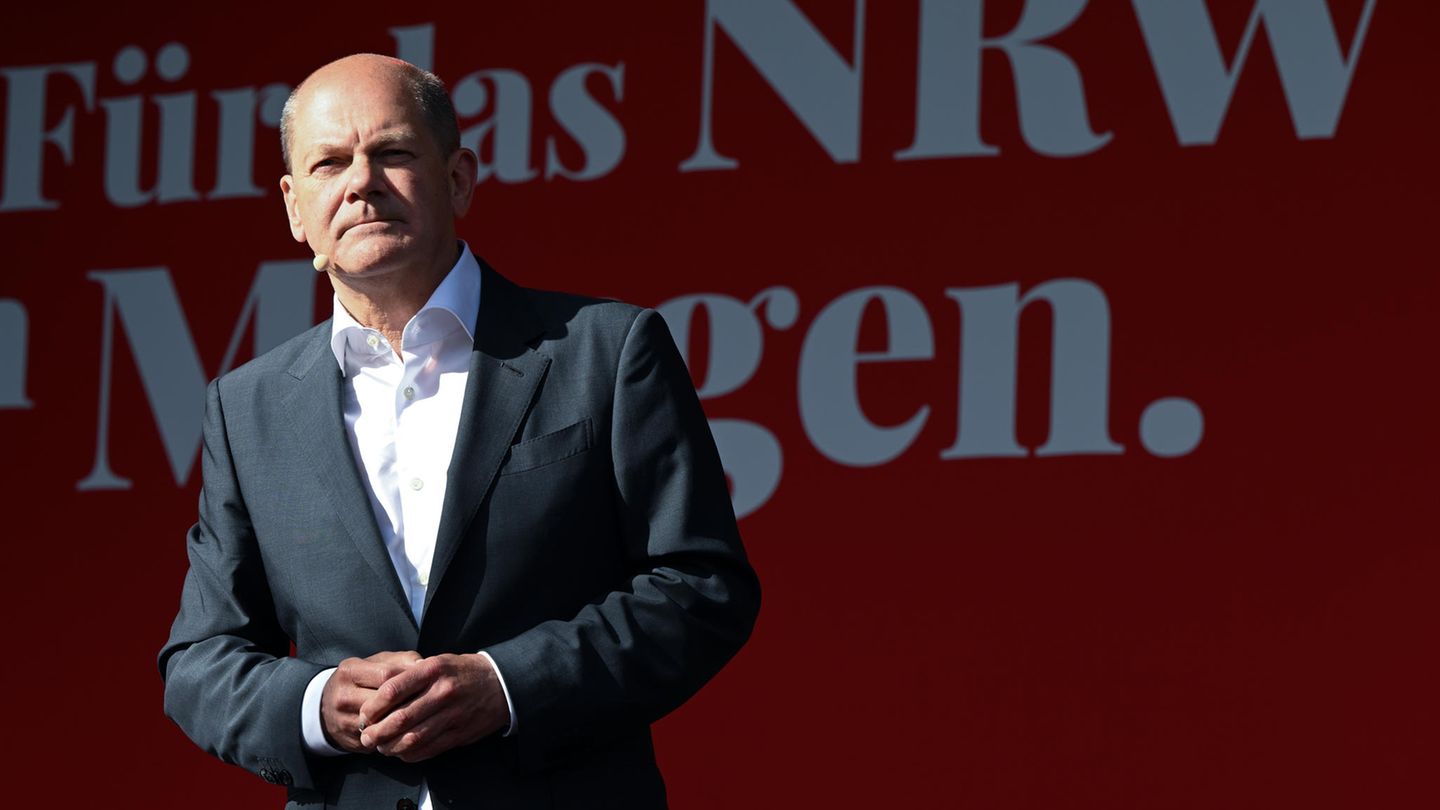analysis
A disappointed SPD, happy Greens and an alarmed FDP: The state elections in North Rhine-Westphalia are likely to have consequences for the power structure of the traffic light coalition in Berlin. That could still be tricky for Chancellor Scholz.
What is left to hold onto? If there is a Scholz effect, then it was not beneficial for the SPD. The Greens are bursting with power. And the FDP is moving in dangerous territory. Anything else? Oh yes, things are going well for the Union again. But one by one.
The most populous federal state has voted, the votes have been counted – and who must now be considered counted is certain. It is also certain that the “small federal election” will not leave federal politics unaffected.
North Rhine-Westphalia has repeatedly cast a long shadow over political Berlin. 2005 marked , 2012 by Chancellor Angela Merkel, 2017 possibly secured Merkel her fourth term in office, after and achieved a historic election victory.
And 2022?
This time, too, the state election could have an impact on federal politics. Chancellor Olaf Scholz could now have to deal with coalition partners who want to make a more demonstrative profile (FDP) and will appear more broad-legged (Greens), while the SPD should at least realize that their chancellor is not being used as a driving force.
SPD: rejection of Scholz
That became clear with this election. Scholz completed several election campaign appearances in North Rhine-Westphalia, had posters posted alongside the SPD’s top candidate, with Thomas Kutschaty one would also choose the “direct line to the Chancellery”, . But the obvious hope for the chancellor bonus was disappointed.
With Scholz as the choice argument, he was inevitably voted on as well. And thus about his Ukraine policy, his – depending on the reading – level-headed or hesitant attitude towards arms deliveries and his communication, which is often perceived as insufficient. Scholz and the SPD in Düsseldorf could now have received the receipt for this. The beginning of the social-democratic decade, , can be postponed after six months.
Greens: New consciousness of power
Instead, the Greens are bursting with strength, having previously achieved a historic result in the state elections in Schleswig-Holstein. Although they failed in Saarland at the five percent hurdle, they were able to top their disappointing result from the federal election (14.6 percent) twice.
That should be belated satisfaction for the party, as it sometimes had to make major concessions in the federal government. A speed limit was not enforced, stricter corona rules failed because of the FDP. In addition, in the course of the Russian war of aggression, the Greens – like probably no other traffic light party – clearly distanced themselves from central principles. They are now campaigning, above all Federal Economics Minister Robert Hobeck and Federal Foreign Minister Annalena Baerbock, for armament instead of disarmament and support the construction of liquid gas terminals.
The about-face, which Habeck in particular communicates in a refreshing and sometimes shockingly honest way, is apparently appreciated by the voters. Alone: they are green. All of this could help the Greens appear with a new self-confidence in the federal government and show themselves to be more power-conscious when it comes to pushing through green issues.
FDP: It’s not working
In view of the election results, the FDP could also try to make its politics more recognizable – albeit for different reasons. Where the return to federal politics once began, it is now a matter of coping with a “disastrous defeat,” as party leader Christian Lindner called the election result. Although the Liberals in Saarland were able to increase slightly, they ultimately failed at the five percent hurdle. In Schleswig-Holstein from 2017, in North Rhine-Westphalia even getting into the state parliament was on the brink.
Above all, the most recent ballot represents a bitter defeat, the federal political importance of the (at the time largest) FDP state association is already apparent in Lindner’s leadership team in Berlin: The Federal Minister of Justice comes from North Rhine-Westphalia, the Secretary General and the First Parliamentary Manager of the Bundestag faction as well – and not least the party leader and Federal Minister of Finance Lindner himself.
The FDP was neither able to gain points from the Jamaica coalition in Schleswig-Holstein nor from the black-yellow alliance in North Rhine-Westphalia – and the participation in the government in Berlin apparently could not make up for that. In short: Being part of a government did not pay off for the FDP.
Lindner, who completed eight election campaign appearances in North Rhine-Westphalia before the election Sunday, will have to find an answer as to how this can be changed. “The FDP must also be perceptible as an economically liberal force”, . “That’s a special challenge in traffic lights.”
So what’s left to hold onto? The Greens could want to set more topics in the traffic light out of a new self-confidence, the FDP out of concern about a loss of importance as well, while the SPD could worry about falling behind. A potentially explosive mixture that is likely to be exploited by Union opposition leader Friedrich Merz – who can feel like a winner after the last two state elections.
It could be uncomfortable for the Chancellor and Prime Minister Scholz. And the next mood test is already in the offing: On October 9th, the state chancellery in Lower Saxony will be elected for the SPD.
Source: Stern
David William is a talented author who has made a name for himself in the world of writing. He is a professional author who writes on a wide range of topics, from general interest to opinion news. David is currently working as a writer at 24 hours worlds where he brings his unique perspective and in-depth research to his articles, making them both informative and engaging.




